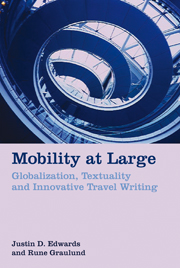Book contents
- Frontmatter
- Contents
- Acknowledgements
- Introduction: Travel Revisited
- 1 Travelling with the Ondaatje Bros.
- 2 Amitav Ghosh and Caryl Phillips: Global Travel, Then and Now
- 3 Unhomely Travels; or, the Haunts of Daphne Marlatt and W. G. Sebald
- 4 The World, My City: Home Grounds and Global Cities
- 5 Travel Histories – From Kuala Lumpur to Istanbul and Beyond
- Postscript: Still Mobile
- Bibliography
- Index
2 - Amitav Ghosh and Caryl Phillips: Global Travel, Then and Now
- Frontmatter
- Contents
- Acknowledgements
- Introduction: Travel Revisited
- 1 Travelling with the Ondaatje Bros.
- 2 Amitav Ghosh and Caryl Phillips: Global Travel, Then and Now
- 3 Unhomely Travels; or, the Haunts of Daphne Marlatt and W. G. Sebald
- 4 The World, My City: Home Grounds and Global Cities
- 5 Travel Histories – From Kuala Lumpur to Istanbul and Beyond
- Postscript: Still Mobile
- Bibliography
- Index
Summary
This chapter reads Amitav Ghosh's In an Antique Land (1992) and Caryl Phillips's The Atlantic Sound (2000) as travel texts that challenge the Eurocentric conventions of the genre. In both cases, the texts foreground a non-European itinerary and ontology: Europe is provincialized, rather than the centre from which the traveller physically and conceptually departs. For Ghosh, the intervention and transformation of the travel genre edits out Europe completely; for Phillips, though, there is a reordering of the hierarchical conceptions of home and away, inscribing Europe as potentially foreign and exotic. The former erases Europe to produce, as Inderpal Grewal suggests, ‘a new map of the Old World as the world without Europe’; the latter recalibrates the cartographies of Europe so it no longer holds a privileged position (184). By locating ontological and physical departure points in India (Ghosh) and Ghana/St Kitts (Phillips), these travel texts propose alternative routes to those Eurocentric itineraries that conceive of Europe as home.
This challenge to the spatial dimensions of the conventional Eurocentric travel narrative is mirrored in representations of temporality. For by fluidly moving back and forth in time, these texts offer perspectives on empirical observations in the past and present, imparting diverse points of view on a single event. Ghosh and Phillips, then, suggest that multifaceted visions of history are a more constructive way of viewing the world and the experience of travel than a single authoritative perspective.
- Type
- Chapter
- Information
- Mobility at LargeGlobalization, Textuality and Innovative Travel Writing, pp. 49 - 76Publisher: Liverpool University PressPrint publication year: 2012



